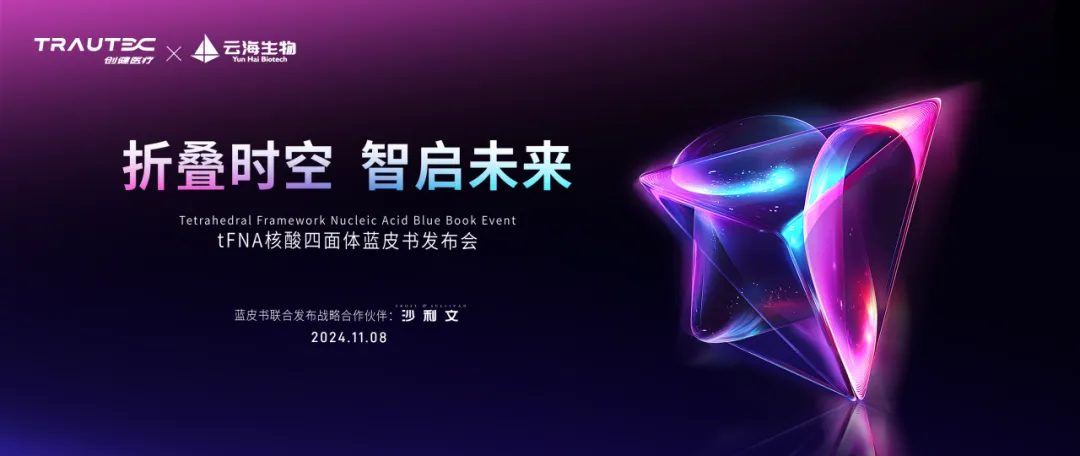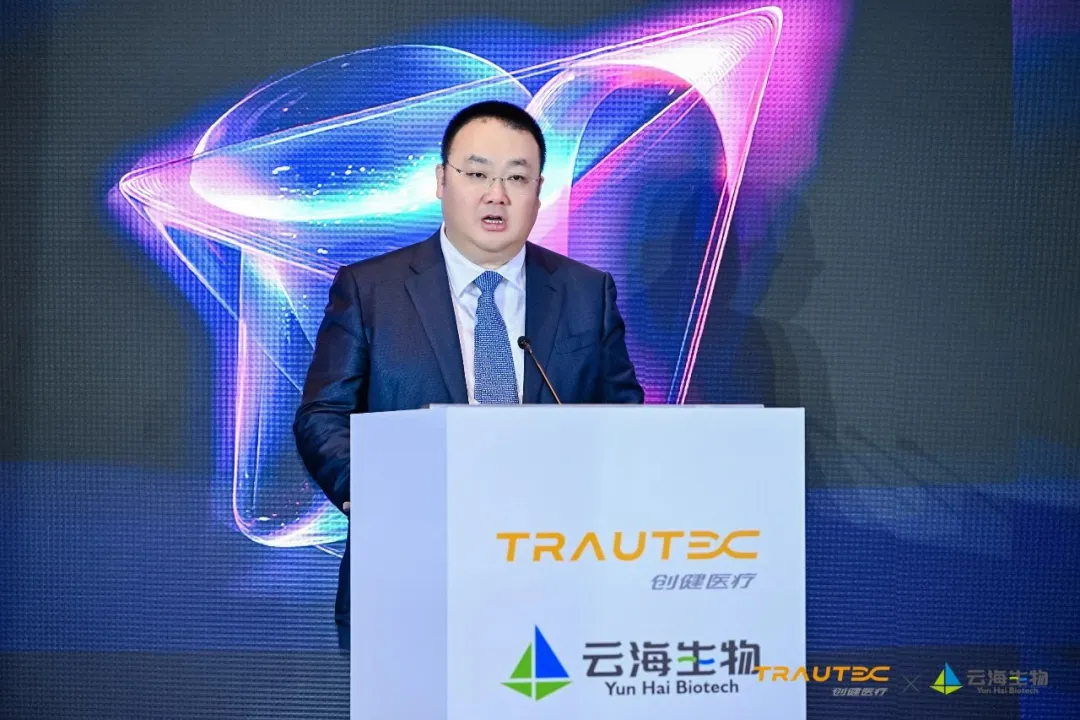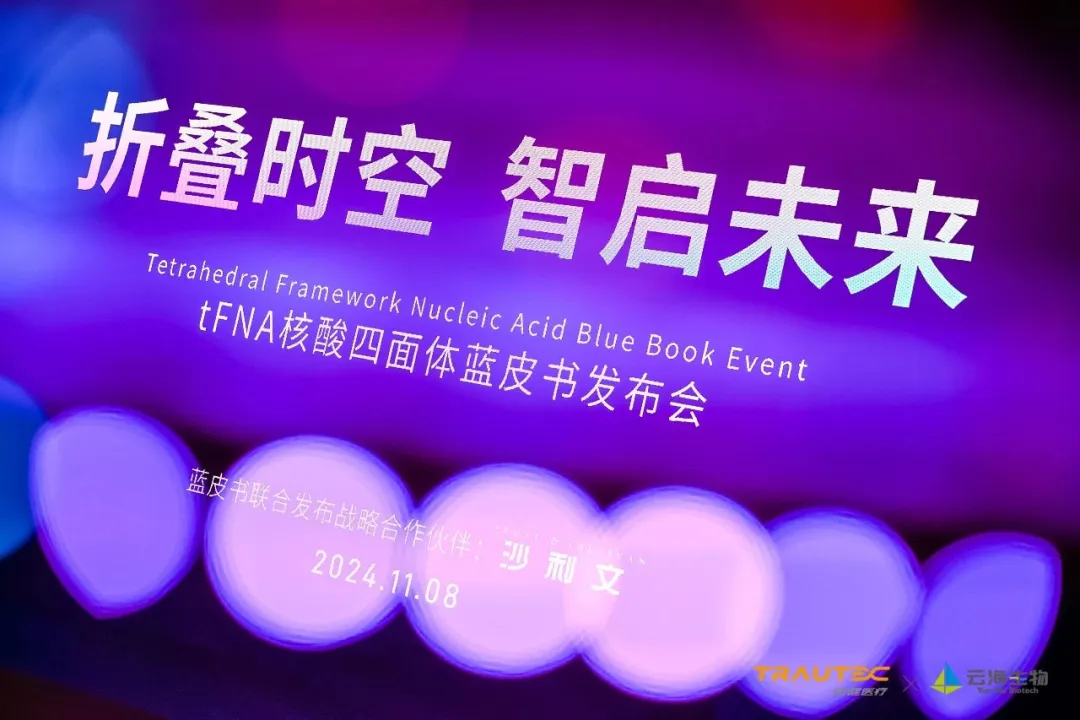Tetrahedral Framework Nucleic Acid Blue Book Event Successfully Held
2024-11-09
Another groundbreaking innovation is unveiled, injecting fresh vitality into the cosmetics industry!
On November 8, 2024, Tetrahedral Framework Nucleic Acid Blue Book Event was held successfully at the W Hotel on Shanghai's Bund. With the theme “Folding Time and Space, Igniting the Future,” the event was co-hosted by Genesis Healthcare, Yunhai Bio, and Frost & Sullivan. Yunhai Bio’s President, Professor Delun Luo, and Vice President, Professor Rong Li, were invited to attend the event.

New Breakthrough: Addressing Key Supply Chain Challenges in Raw Materials
What is a "Tetrahedral Nucleic Acid"?
A tetrahedral nucleic acid (tFNA) is a three-dimensional nanostructure composed of four carefully designed single-stranded DNA (ssDNA) molecules that assemble through complementary base pairing. This structure offers high stability, editability, and low immunogenicity, presenting new opportunities for advancements in DNA nanotechnology.
“Nucleic acids are one of the core molecules of life, and delivering nucleic acid-based drugs is a crucial scientific and technological challenge in medicine,” explained Professor Yunfeng Lin, Deputy Party Secretary of West China School of Stomatology and Deputy Director of the State Key Laboratory of Oral Diseases at Sichuan University. “By developing a patent portfolio around novel tFNA delivery systems, we aim to establish independently controlled intellectual property, which could help address critical supply chain bottlenecks in China.”
Tetrahedral nucleic acids and peptides make a natural pair.
Professor Yunfeng Lin further noted that tFNAs exhibit strong transdermal delivery capabilities, penetrating up to 500 microns deep in the presence of hair follicles. This suggests that in the future, tFNAs combined with peptides could enable effective transdermal drug delivery. Additionally, as an effective carrier, tFNA can be used to deliver active compounds like glabridin for skin-whitening applications.

Yunfeng Lin, Deputy Party Secretary of the West China Hospital of Stomatology at Sichuan University and Deputy Director of the State Key Laboratory of Oral Diseases
The tFNA (tetrahedral nucleic acid) serves as both a nucleic acid drug and a delivery vehicle.
Currently, tFNA has advanced to preclinical stages in ophthalmology. At the event, Xiaoyan Ding, Director of Fundus Surgery at Zhongshan Ophthalmic Center, also spoke, noting that for age-related macular degeneration (AMD), patients typically require 5 to 9 VEGF injections in the first year alone. "Our hope is that, in the future, patients could manage their condition with regular tFNA-based eye drops, eliminating the need for numerous injections."

Dr. Xiaoyan Ding, Director of Fundus Surgery, Zhongshan Ophthalmic Center
New Technology: Pioneering Global Nucleic Acid Biosynthesis
This milestone establishes a foundation for innovative applications across more fields.
Chunhai Fan, Academician at the Chinese Academy of Sciences, who first proposed the "framework nucleic acid" concept internationally, also attended. He shared, “The extensive recognition of nucleic acid research in Nobel Prizes underscores the revolutionary potential of nucleic acid drugs in modern medicine. This Blue Book paves the way for tFNA to catalyze breakthroughs in diverse fields.”
Academician Fan commended Chuangjian's accomplishments, emphasizing that realizing transformative breakthroughs requires a commitment to both lab work and production lines. Only by deeply integrating scientific innovation with product development can we enhance product value and achieve competitive advantages.
 Academician Chunhai Fan, Chinese Academy of Sciences
Academician Chunhai Fan, Chinese Academy of Sciences
Beyond Recombinant Collagen
Song Qian, Chairman of Chuangjian Medical Technology Co., Ltd., addressed public perception, acknowledging the company’s reputation for recombinant collagen. However, since 2019, Chuangjian has been researching tFNA technology. By 2024, leveraging strengths in synthetic biology and collagen mass production, Chuangjian achieved scalable tFNA production through biological synthesis, overcoming challenges in sequence design, DNA extraction, enzyme cutting, and raw material purification, providing stable tFNA raw materials for skincare and pharmaceuticals.
 Song Qian, Chairman, Jiangsu Chuangjian Medical Technology Co., Ltd.
Song Qian, Chairman, Jiangsu Chuangjian Medical Technology Co., Ltd.
A New Approach: Leading the Trend in Nucleic Acid Skincare
Provides new ideas for innovative applications in cosmetics.
Yan Yun Ma, a young researcher from Fudan University’s Institute of Engineering and Applied Technology, shared research on tFNA's efficacy in repairing photodamage and photoaging. He noted that DNA damage plays a critical role in skin aging. Experimental results show that tFNA, as a cosmetic ingredient, possesses significant DNA repair capabilities. By reducing levels of 8-hydroxy-deoxyguanosine (8-OHdG) and cyclobutane pyrimidine dimer (CPD), tFNA effectively repairs DNA damage from oxidative stress and UV exposure, potentially slowing down skin aging.
 Yan Yun Ma, Researcher, Institute of Engineering and Applied Technology, Fudan University
Yan Yun Ma, Researcher, Institute of Engineering and Applied Technology, Fudan University
Three Unique Advantages in Anti-Aging
Chuangjian Medical’s technical expert, Fusheng Wei, introduced the self-loading Corner Attack folding technology, which delivers tFNA transdermally, reaching up to 0.4mm into the dermis and remaining stable for up to 48 hours. Described as a versatile "hexagonal warrior," tFNA offers high activity and robust healing properties, excelling in transdermal performance, anti-aging at the cellular level, and delivering targeted components.
 Fusheng Wei, Technical Expert, Jiangsu Chuangjian Medical Technology Co., Ltd.
Fusheng Wei, Technical Expert, Jiangsu Chuangjian Medical Technology Co., Ltd.
The release of this Blue Book offers valuable insights into tFNA research and applications, inspiring professionals across related fields. Yunhai Bio looks forward to tFNA's potential in sparking a new wave in nucleic acid-based skincare, contributing to sustainable development for society.



